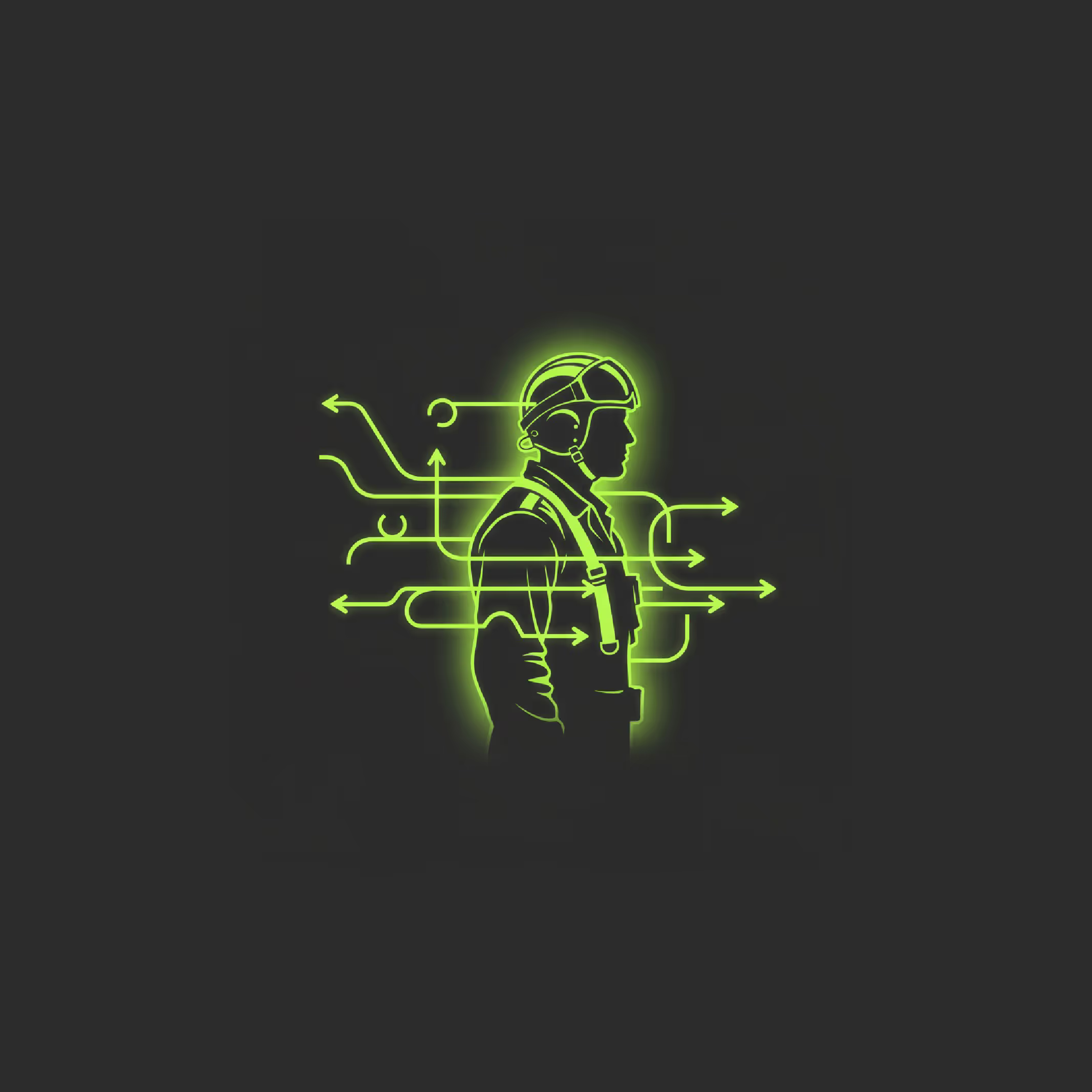Navigate AI like a fighter pilot: Use the OODA loop - Col. John Boyd

[Personal Note] Carver is deeply inspired by the work of Col. John Boyd. Boyd wasn’t just a fighter pilot or the designer behind the F-16—he was a thinker who reshaped how we understand decision-making in fast, uncertain environments. His insights matter today more than ever, as we navigate the biggest shifts in decades.
Col John Boyd in a testimony before the House Armed Services Committee: "Conflict can be viewed as repeated cycles of observing, orienting, deciding and acting by both sides, and also, I might add, at all levels. The adversary that can move through these cycles faster gains an inestimable advantage by disrupting his enemy's ability to respond effectively."
Look, I'll be honest with you—most leaders won't say this part out loud, but they're stuck.
Last week, a product head at a fintech pulled me aside after a conference. "I literally can't make any big moves right now," she said, swirling her coffee. "Not until I figure out what the hell Trump's policy team is actually planning." Then yesterday, an investment exec—guy's been in the game 20 years—admitted something similar over drinks: "You know what I really need? Some magical way to track everything happening in my industry without drowning in it."
Here's the thing: Behind all those confident LinkedIn posts and quarterly earnings calls, CEOs, risk managers, and investors are losing sleep over the same nagging thought: What if I'm missing something huge right now?
The current market? Everything's coming at you sideways. Nothing's predictable. And if you blink too long, you're done. Fighter pilots figured this out decades ago—they had to. They developed something called the OODA Loop, and honestly, it might be exactly what we need right now.
Why Everything Feels Impossible Right Now
You know that feeling when you're standing in the cereal aisle for ten minutes because there are too many damn choices? That's basically running a company in 2025.
1. Information overload: Sure, you've got dashboards. Fancy ones. But finding the stuff that actually matters? Good luck with that needle-in-a-haystack situation.
2. Everyone's moving fast: Your competitors just launched something. Regulators changed the rules (again). Meanwhile, your board meeting isn't for another two weeks.
3. The cost of waiting: Here's what nobody talks about—doing nothing isn't actually neutral. It's like compound interest, but backwards. Every day you wait, those blind spots get bigger.
OODA: When a Fighter Pilot Teaches Business Strategy
So there was this Air Force colonel, John Boyd. Bit of a maverick, from what I've read. He came up with the OODA Loop—Observe, Orient, Decide, Act. His whole philosophy boiled down to this: In a dogfight, the pilot who could think and adapt faster usually walked away alive.
Boyd had this great line (I'm paraphrasing here): You don't need perfect information. You need to move faster than the chaos.
Breaking the Paralysis (Without Breaking Everything Else)
Here's how it actually works:
1. Observe: Quit waiting for the fog to clear—it won't. Just start collecting whatever intel you can get your hands on.
2. Orient: This is the part everyone screws up. You can't just stare at data. You have to ask, "Okay, but what does this mean for us specifically?"
3. Decide: Forget the perfect master plan. Make smaller calls. Test things. (I learned this the hard way after sitting on a decision for three months only to watch a competitor eat our lunch.)
4. Act: Just... do something. Seriously. Motion creates information, and information creates better decisions.
For CEOs, this means you stop looking indecisive and start building momentum. Risk managers? You get to move fast without feeling like you're gambling with the company's future. And investors can finally tell which companies are built for this chaos and which ones are about to become cautionary tales.
Making OODA Real (With Some AI Help)
Okay, philosophy is nice, but let me get practical here.
1. Observe: Set Up Your Radar
- Get alerts that actually matter. I'm talking regulatory changes, competitor moves, the works.
- Use AI to filter out the BS. (Because 90% of "breaking news" isn't actually breaking anything.)
2. Orient: Connect the Dots
- This is where AI gets interesting—it can spot patterns you'd miss after your third cup of coffee.
- Pull everything into one place. Stop jumping between seventeen browser tabs like we're still in 2015.
3. Decide: Speed Up Without Screwing Up
- Run quick simulations. Ask "what if we did X?" and get an answer in minutes, not weeks.
- Create a simple system where three people can make a call instead of needing twelve committees
4. Act: Ship It
- Automate the boring stuff so decisions actually turn into... you know, actions.
- Build in feedback mechanisms. Did it work? Great. Did it fail? Even better—now you know something.
The Bottom Line
I started this piece talking about that quiet fear leaders have—missing the signal that changes everything.
Here's what fighter pilots know that most executives don't: You're never going to have all the information. The weather won't clear. The enemy won't slow down. Your only real advantage is getting comfortable with that discomfort.
Build your OODA loops tight. Observe faster. Orient smarter. Decide quicker. Act now. Because while everyone else is waiting for the perfect moment, you'll already be three moves ahead.
That's not just surviving the chaos—that's using it as rocket fuel.
Carver is a business radar. It helps observe, understand, and act on risks and opportunities. Carver is an implementation of the Col John Boyd's ideas. Watch our YouTube channel as well